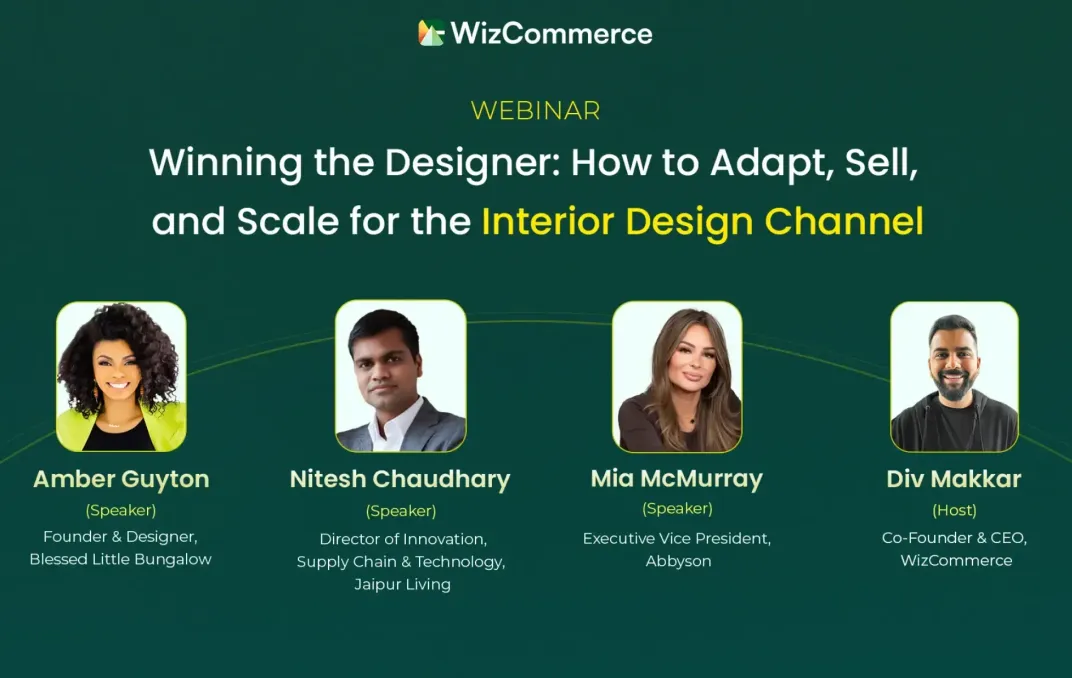Contents
Hosted by WizCommerce | Featuring experts from Jaipur Living, Abbyson, and Blessed Little Bungalow
In today’s wholesale landscape, interior designers are no longer a niche segment—they’re power buyers with distinct needs and high expectations. To help wholesalers better serve this fast-growing channel, WizCommerce hosted an expert-led webinar titled “Winning the Designer: How to Adapt, Sell, and Scale for the Interior Design Channel.”
The session brought together three industry leaders:
- Amber Guyton – Interior Designer & Founder, Blessed Little Bungalow
- Nitesh Chaudhary – Director of Innovation, Supply Chain, and Technology, Jaipur Living
- Mia McMurray – Executive Vice President, Abbyson
Moderated by Div Makkar, CEO and Co-founder of WizCommerce, the discussion unpacked what it really takes to serve designer buyers at scale.
Why the designer channel matters now
Interior designers are no longer an afterthought in wholesale—they are central to growth strategies. But why now?
In recent years, the design economy has exploded. Consumers increasingly turn to designers for expertise as they invest more in curated, personalized living spaces. Designers have become the ultimate tastemakers, shaping homes and influencing purchasing decisions and brand awareness. They don’t just specify a product—they advocate for it.
However, they also demand more. They need vendors who understand the nuances of sourcing for individual clients, who can handle low minimums, offer swatches on demand, and respond quickly. Winning over this segment isn’t about volume—it’s about value.
Unlike traditional retailers, designers:
- Buy per project, not in bulk
- Expect low MOQs, custom quoting, and on-demand swatches
- Seek inspiration, speed, and flexibility—not just transactions
This shift demands not just operational changes, but an entirely new mindset.
Key takeaways from the webinar
1. Understanding the Designer Buyer: More Than Just a Customer
“Designers are in control of nothing, but blamed for everything.” – Amber Guyton
This encapsulates the pressure designers face daily. Designers aren’t just placing orders—they’re storytellers, problem-solvers, and brand advocates. Building strong, flexible relationships is key. They need vendor partners who understand their creative process, offer room to brainstorm, and provide personalized support.
What they value most:
- Responsive sales reps
- Flexible lead times
- Authentic, non-pushy communication
- Visual inspiration and curated experiences
2. Merchandising for designers: Curated, modular, visual
“Designers aren’t buying SKUs—they’re buying for stories, spaces, and people.” – Mia McMurray
Mia outlined how Abbyson reshaped their merchandising strategy by:
- Offering modular product lines and curated capsules
- Creating visual content for presentations
- Designing with flexibility in mind, without alienating retail partners
Pro tip: You don’t have to choose between retailers and designers—you just need to structure your assortment and messaging to speak to both.
3. Sales & service: One size doesn’t fit all
“You can’t expect someone used to container orders to sell effectively to designers.” – Nitesh Chaudhary
At Jaipur Living, the sales team is segmented by designer type:
- Independent designers (handled by inside sales)
- Small to mid-sized design firms (serviced in person)
- Commercial firms (supported with specification needs)
Personalized service is non-negotiable. Quick quote tools, real-time availability, and sample management systems are table stakes.
4. Digital discovery is the new trade show
“I pin, save, and sort everything online first—long before I step into a showroom.” – Amber Guyton
Designers discover brands on Instagram, Pinterest, and TikTok. If your digital presence isn’t inspiring or searchable, you’re invisible.
What works:
- Visual-first content (mood boards, install videos, styled shoots)
- SEO-friendly product discovery (e.g., “pink armchair”)
- Easy swatch requests and mobile-friendly ordering
- Community-led marketing (panels, stories, designer features)
5. AI as an enabler, not a replacement
“AI can’t replace emotion, but it can free up time for real relationships.” – Nitesh Chaudhary
Designers want personalization. AI helps reps deliver it at scale. Examples from the discussion:
- Instant product recommendations based on past orders
- AI-generated mood boards to reduce sourcing time
- Automated spec sheets, CAD files, and asset kits
- AI-powered chat tools for order updates and quick answers
Example: WizCommerce’s brand-new WizStudio is an AI tool that generates high-quality lifestyle imagery using just a product photo, empowering brands to showcase designs affordably and at scale.
Also read: 10 Best AI Product Photo Generators You Can Try in 2025
Marketing to designers: The new rules
According to Mia, great marketing to designers boils down to three things:
- Inspiration – Lead with style, trends, and storytelling.
- Ease – Back it up with frictionless buying tools and clear specs.
- Authenticity – Designers see through fluff—keep it real and consistent.
The future of the designer channel
Nitesh shared that Jaipur Living is doubling down on the designer channel—investing in tech, team structure, and tools to support even small independent designers with the same care as large firms.
“Whether you’re a one-person shop or a 50-person firm, you deserve personalized service.”
Final thoughts
The interior design channel is booming—but only for those who are willing to evolve. If you want to win the designer’s attention, you need to think beyond SKUs and spreadsheets.
💡 WizCommerce helps wholesalers do exactly that—with custom quoting, AI-powered product search, swatch and sample workflows, mobile order tools, and much more.
👉 Want to see it in action? Book a demo with WizCommerce
